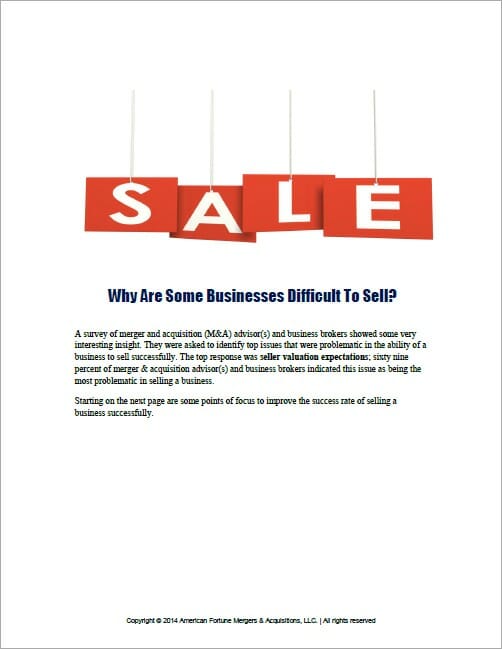Business Acquisition Process For Successful Results
Business acquisition in your future? Most of us look for ways to control our destiny. Many people want to set their own schedules, have unlimited earning potential, and chart their own course through life. Unfortunately, so many people have given up those dreams and resigned themselves to living for the security of a static paycheck and an employer that provides health insurance, among other benefits. However, others face the decision head-on: will they stay an employee for the remainder of their career, or consider self-employment?
Deciding between traditional employment and self-employment usually comes because of an external force. A lost job or unexpected life event might suddenly shake away the misconception of stability in conventional employment. For those facing such a decision, one viable option is business ownership. This article looks at the vital elements of the business acquisition process.
Considering Business Acquisition
There are three avenues that lead to business acquisition: starting your own business, purchasing a franchise, or buying an existing business. Of the three, starting a new business is the riskiest route. You need ample capital, a well-thought-out business plan, and a marketable concept. Taking risks to open a business can be exhilarating and fruitful.
However, most new businesses don’t make it through these introductory risks. Most new companies, across a wide variety of industries, fail within the first five years. The U.S. Bureau of Labor Statistics data shows that only about 25% of businesses make it to 15 years for more.
Buying a Franchise or an Established Business
Buying a franchise can give that same thrill of opening a start-up business but with a safety net. The risks are substantially lower, as there is some built-in value through the brand name, tested and proven marketing and operating systems, and the support of a franchisor. However, even a new franchise can take up two years to yield a profit.
Purchasing a franchise is not always easy, and there are times when companies aren’t as supportive as their new franchisee’s expected. Buying a franchise requires a fair amount of research, which is true for any business acquiring process. If you’re looking into purchasing a franchise, then you may need to ensure that you’ve done all of your due diligence and have clear goals for the future. When you purchase a franchise you might choose to explore your passions with some support and a fair opportunity at continuous growth. Or, new franchise owners might look to have many operating franchise locations, years down the line.
Buying an existing business can enable the purchaser to benefit from the organization built by the previous owner, but still have room for creativity and growth. When people purchase an existing business, they should have the freedom to bring in their own personality and take advantage of new opportunities. When you buy a business, you’re not just “buying a job,” you’re buying the lifestyle. It’s the chance to build a future and to create a legacy, leaving your kids with something of real value.
Conducting Due Diligence in the Business Acquisition Process
Due diligence refers to the steps you must do in order to ensure that you’re legally buying the business correctly. However, the term often comes up when discussing reasonable elements of research and planning. When it comes to due diligence and the business acquisition process, you can’t be careful enough.
There are two stages of due diligence: preliminary and secondary. The preliminary phase happens before you make an offer on an established business. It generally revolves around an in-depth review of the company’s general information and detailed financial records.
If you chose to make an offer, you’ll have the opportunity to list various contingencies that would allow you “out” of the offer if any of these contingencies aren’t met. After you make the offer and provide your contingencies, you’ll have the opportunity to review and audit any information pertaining to the business.
People looking to acquire a business often turn to experts for support. It’s highly recommended that they utilize consultants such as Merger & Acquisition advisors, accountants, and attorneys. These consultants often place their concerns in legal liability and are sometimes overly cautious about recommending a business acquisition. When selecting your team of consultants, make sure to turn to reputable M&A consultants. You’ll then have the task of analyzing their recommendations, reviewing the data and facts about the business, and finally determining whether the acquisition fits within your goals, options, and set risk factors.
Securing Financing
Securing financing is a critical part of acquiring a business, and banks can be leery of financing business purchases. If the potential borrower has little or no direct operating experience with the company in question, it can be challenging to get the funding they need to move forward. These troubles in securing financing can also hinder negotiations and put off the likelihood of agreeable deal terms.
Most businesses have a few hard assets which the new owner could sell to repay the loan in the event of default. Their “worth” is in their continuous, profitable operation of the company. The last thing the bank wants to experience is having to operate your business successfully in order to secure repayment. They want to know that there’s an option to cover the loan if you don’t make it. Banks are in the business of lending money — not operating business enterprises.
There is also the option of a Small Business Administration (SBA) backed loan. SBA loans can provide financing for start-ups and business acquisitions. However, SBA loans can be challenging to obtain because of financial, operation, and collateral issues. You can research and investigate your SBA loan options through your local banker. SBA also places a lien against your existing mortgage. Please visit the Small Business Administrations’ website at www.sba.gov for information on current lending requirements.
Seller Financing and Earn-Outs
It is easier to access business acquisition loans when a buyer can combine them with seller financing or earn-outs. Seller financing and earn-outs are extremely common in business transfers and are often considered as part of the business acquisition process. The structure of the financing can rely on a traditional loan with a normal repayment schedule, or an earn-out with payments based on a percentage of future revenue.
An earn-out is a provision within the contract that the seller must obtain additional compensation when the business meets certain financial goals. Typically, earn-outs are meant to benefit both the buyer and the seller. It allows the buyer to build experience within the company and incentivizes the buyer to perform well financially to close the obligation. Not all earn-outs are the same, and it’s vital that M&A Consultants work to set realistic expectations for both parties.
Seller financing is another contractual agreement which typically affects the real estate involved in the deal. Instead of turning to a financial institution the seller may handle the mortgage, this is also known as a purchase-money mortgage.
Seller financing and earn-outs could provide you with some comfort that the seller now has a vested interest in your ongoing success with the business.
Learning from a Previous Owner
When you buy into an existing business you can benefit from its income stream and the relationships that are already in place. The previous owner has cultivated relationships with employees, vendors, and customers, and you can learn from how that. You can learn to found and develop these types of relationships.
There are other ways to learn from the previous owner as well. Unfortunately it’s a fairly common occurrence that the operating knowledge from the past owner isn’t properly documented. Many new owners learn too late in the business acquisition process that there were very few written policies, or procedures. When negotiating with the seller, and as part of your due diligence ensure that you address these elements. It’s possible that the seller would be able to remain with the business for a period of time to allow the buyer to benefit from the seller’s operating experience.
How to Get Started With the Business Acquisition Process
The business acquisition process can be long and might come with a variety of unexpected obstacles. Skilled professionals can help ease the process, guide new buyers through the steps, and ensure that legal elements are handled before problems arise. But, as someone looking for a business opportunity you’ll want to ensure that you’re buying everything you need to continue operations, and that this is a business venture you’re passionate about pursuing.
Purchasing an existing business is a big decision and one that you should consider very carefully. Make sure that you spend time and utilize M&A Consultants who can lend an expert hand at every step in the business acquisition process. They can help you understand due diligence while you ensure that you’re researching and reviewing elements of the company that mean the most to you. Ensure that you’re negotiating seller financing options, and try to learn everything you can from the existing owner. Like many business owners, you should find the experience extremely rewarding!
Speak with one of our M&A Consultants to learn about the essentials of business acquisition process.
Posted by Brian s. Mazar, CBI, MBA
American Fortune







